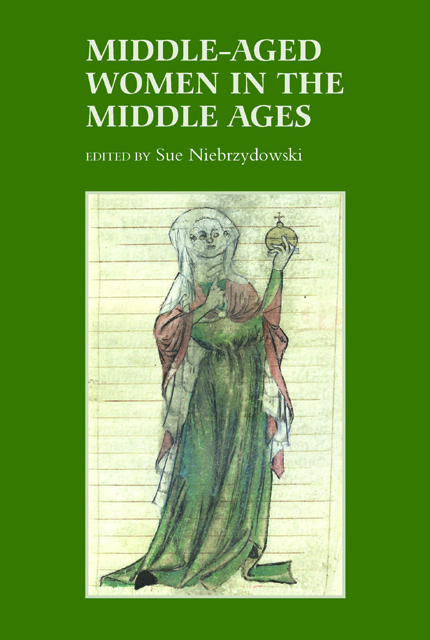Book contents
- Frontmatter
- Contents
- List of Plates
- Abbreviations
- Contributors
- Introduction: ‘Becoming bene-straw’: The Middle-Aged Woman in the Middle Ages
- 1 The Age of Discretion: Women at Forty and Beyond
- 2 Seeking the Middle-Aged Woman in Medieval Wales
- 3 Middle Age in Romance? Magic, Enchantment and Female Power
- 4 Age and Desire in the Old English Life of St Mary of Egypt: A Queerer Time and Place?
- 5 The St Albans Psalter: Sex, Desire and the Middle-Aged Woman
- 6 Speaking Volumes: the Middle-Aged Woman and the Book in Medieval England
- 7 ‘Late hir seye what sche wyl’: Older Women’s Speech and the Book of Margery Kempe
- 8 Preparing for Mature Years: the Case of Margaret of Anjou and her Books
- Select Bibliography
- Index
8 - Preparing for Mature Years: the Case of Margaret of Anjou and her Books
Published online by Cambridge University Press: 14 February 2023
- Frontmatter
- Contents
- List of Plates
- Abbreviations
- Contributors
- Introduction: ‘Becoming bene-straw’: The Middle-Aged Woman in the Middle Ages
- 1 The Age of Discretion: Women at Forty and Beyond
- 2 Seeking the Middle-Aged Woman in Medieval Wales
- 3 Middle Age in Romance? Magic, Enchantment and Female Power
- 4 Age and Desire in the Old English Life of St Mary of Egypt: A Queerer Time and Place?
- 5 The St Albans Psalter: Sex, Desire and the Middle-Aged Woman
- 6 Speaking Volumes: the Middle-Aged Woman and the Book in Medieval England
- 7 ‘Late hir seye what sche wyl’: Older Women’s Speech and the Book of Margery Kempe
- 8 Preparing for Mature Years: the Case of Margaret of Anjou and her Books
- Select Bibliography
- Index
Summary
On 2 August 1482, aged fifty-two, Margaret of Anjou, former queen of England and consort of the late Lancastrian king Henry VI, ‘seyne d’entendement, raison et pensée, combien que débille et inferme de corps’ (‘of sound understanding and reasoning but frail and infirm in body’), had her will drawn up shortly before her death. Margaret had been living in France for a decade, in conditions unbecoming a former queen, and had already renounced all her parental inheritance in favour of the French king, Louis XI. In her will she pleaded with Louis to pay all her debts, including the wages of her loyal servants, presumably including ‘madame Catherine de Vaulx’ (Dame Katherine Vaux), her companion during her last years, who appears as a witness in the will and was probably present at her deathbed. The same lady was depicted with Margaret in the Skinners’ Book of the Fraternity of Our Lady’s Assumption, dating from c. 1476. In this illustration Margaret appears in a widow’s clothes, in the autumn of her life, in a traditional pious position, kneeling in front of a prie-dieu on which a book lies open (see Plate 9). At around this time Margaret also commissioned from Georges Chastellain a treatise on the rise and fall of rulers in the form of a dream vision, entitled Le Temple de Boccace.
Margaret’s representation in the Skinners’ Book, and her patronage of a literary work focused on the fate of those in power, are at the same time in consonance with her downfall from power and in contrast with her negative portrayal by contemporary chroniclers. She was regarded, both during her lifetime and after her demise, as a woman of (unnatural) manly disposition, whose political ambitions fuelled years of civil war; she was also accused of selfishness in pursuing her goals and disregarding the destructive effect of her plans on the English population. Several questions arise from this complex picture: how did Margaret herself perceive her role as queen of England? Where did Margaret find inspiration for her bold actions, and how did she develop her approach to politics? A new reading of Margaret’s key investments in what any medieval queen hoped for, a comfortable life in her later years, as a respected queen, mother, wife and potential grandmother, emerges from the present analysis.
- Type
- Chapter
- Information
- Middle-Aged Women in the Middle Ages , pp. 115 - 138Publisher: Boydell & BrewerPrint publication year: 2011



